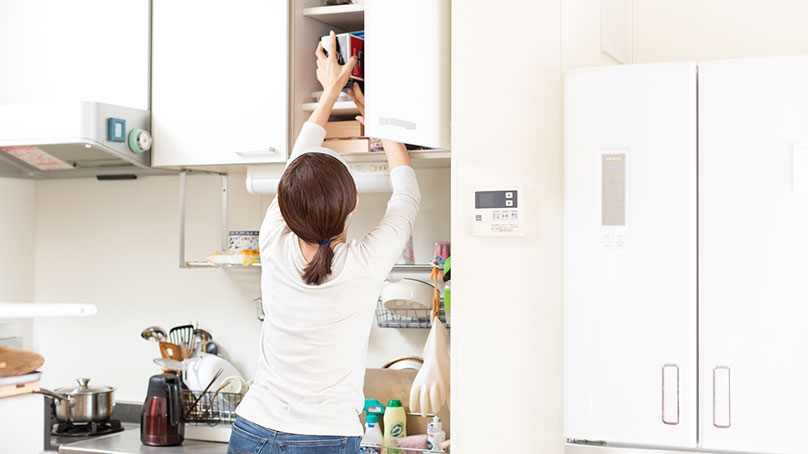5 Kitchen Hacks That Will Make You Want to Cook
August 02, 2017 | Food Lion


Your kitchen: whether it's the magnificent room of your dreams or a small space you have to make do with, a lot happens in it. Kitchens are where families gather, snacks are eaten, and cooking is done. If you haven't been feeling enthusiastic about cooking, though, fear not! There is hope for you.
Having spent years as a private chef, I've worked in kitchens large and small, from studio apartments to 30,0000 square foot mansions, and I can say one thing with surety: kitchens can be made optimally functional at any size. What matters is what you keep out, where you put things, and how much clutter you have.
The tips below are cost-free, and even though they'll take a little bit of time now, they can save you countless hours in the future.
Sacred Ground: The space next to the stove is the most important because it's normal to need items quickly when cooking stove top. What that means is that the most important basics should be kept accessible to your reach at all times. Spatulas that you use regularly should live either in a drawer next to the stove or in a holder next to it. Seasonings such as salt and pepper should be stored in bowls or on a shelf next to the stove . (Note that you shouldn't keep all of your spices above or next to the stove, as the heat may damage them.) The oil that you use most often should be kept about an arm's reach away from the stove, perhaps in a cabinet or in a decorative bottle sitting out on the counter; any closer than that and you'll risk the stove's heat making the oil turn rancid.
Counter Clutter: If you've got a bread maker on your counter because you hope to motivate yourself to make bread one day, but you have to take the blender out of a cabinet every morning to make a smoothie, your layout could definitely use some improvement. Think about what you make most often - not what you think about making - and keep the equipment needed for those things on the counter. It's okay to put a toaster in a cabinet even though it's considered a counter item if you don't use it often, and it's equally okay to keep a waffle maker on the counter if you make waffles multiple days a week. If you own equipment that you never use, consider donating it to someone less fortunate; it isn't useful for anyone so long as it's gathering dust!
Gadgets or Garbage: There are endless options for kitchen tools on the market. From cherry pitters to avocado scoopers, only you know what's a helpful tool and what you'll never touch. Go through all of your gadgets and realistically assess how often you use each, dividing them into categories of "frequently," "occasionally," and "never." For those in the "frequent" category, use a silverware organizer and store it somewhere accessible. With the "occasional" grouping, place in a silverware organizer or bin and move them to a cabinet in a further corner of the kitchen. If you simply don't have the room, store them in a closet. You already know where the "never" pile belongs; similar to any equipment you don't use, consider donating them to others who might find them useful. After prioritizing items and placing them accordingly, what you need and use will always be easy to find.
A Staple Pantry: Having basics on hand for occasions that you do typically cook for can be incredibly valuable. If you're a fan of baking, buy ingredients in bulk and keep flour, cocoa powder, and sugar in decorative jars on a shelf or against a counter wall. If you like to grill, have a couple bottles of barbecue sauce and a spice mix or two in the cupboard; that way when it's time to fire up the range, all you need to purchase are fresh ingredients.
Rotation, Rotation: When you go to the grocery store, the newest items are in the back and the oldest are in the front; your home cabinets and fridge should function similarly. Spare the waste by always putting new products behind the old ones. When doing that, check for expiration dates to ensure that everything you're keeping is still good. If you notice that you're habitually throwing out an item, consider not buying it again. It's is a great opportunity to pare back on foods you think you "should" eat, but don't, so that you contribute less to food waste.
With these tips, cooking should feel less intimidating, and a lot easier to tackle. An organized kitchen with well-placed equipment, gadgets, cupboards, and an overall intuitive feel can make any kitchen seem like your dream kitchen!






Create Your Display Name